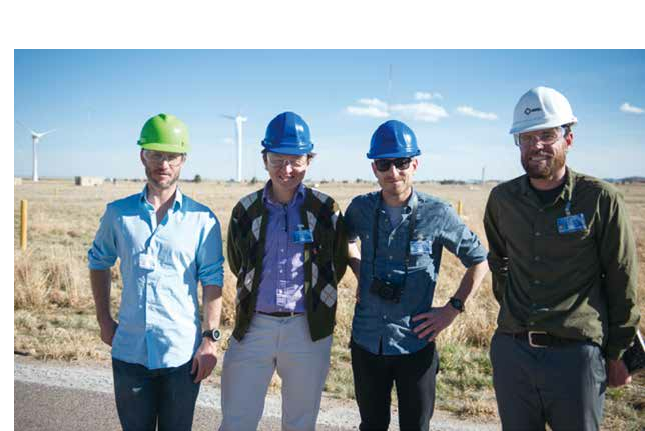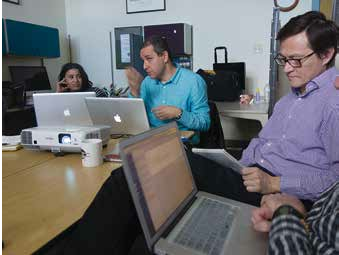Issue:

It’s a tough world out there, but finding funding through fellowships, grants and awards can help a journalist to recalibrate or renew the path ahead.
"Journalism doesn’t pay especially if one is a freelancer.” That’s the common wisdom these days, and it has a ring of truth to it. Media outlets seem to want more and more; they want it yesterday and often for next to nothing.
But there are ways to fund the stories that you want to write, even if an outlet doesn’t want to make it worth your while ways to do a deep investigative dive, supplement income and even spend a semester or two delving into new or familiar topics.
There are literally dozens of fellowships, grants and awards available for foreign and Japanese journalists, ranging from funding of a couple thousand dollars to year-long fellowships with stipends of up to $85,000. While I will focus on U.S. based programs, there are others in Europe, including with the Reuters Institute at Oxford University and the Robert Bosch Foundation in Germany.
The toughest to get but most rewarding are the semester or year-long fellowships at universities and research institutions. Such programs include stipends, fees and class tuition, usually to attend as an auditor. In some cases, they cover travel and research costs for stories, allow one to earn graduate degrees and help pay for expenses for families.
Former FCCJ president Martyn Williams, who received a Knight Fellowship during 2011 and 2012, says there weren’t “many downsides” to having the opportunity to get paid to spend a year studying whatever he wanted at an institution like Calfornia’s Stanford University. “It’s difficult not to want to do,” says Williams, who currently is a senior correspondent for IDG News Service in San Francisco.
Tom Yulsman, who directs the Center for Environmental Journalism at the University of Colorado, Boulder, that oversees the Ted Scripps Fellowship in Environmental Journalism, says journalists should think of a fellowship as a kind of sabbatical. “It should also be an opportunity to recon-sider things, recalibrate and maybe even relaunch,” he says. “There are some points during a person’s career when this makes more sense than others. Is this the right point in yours? Are you truly ready to make the most out of a fellowship? Not just taking a break but taking advantage of the opportunities that a fellowship can offer?”
The application process can be a bit grueling, requiring the same amount of effort as applying to a U.S. college or graduate school, except there are no standardized tests involved. (My vision was blurred by the end of February most deadlines are March 1 or before, after staring at the computer screen for weeks on end.) Applicants should also carefully read and understand the fellowship content, and it helps to become familiar with projects done by past fellows in the programs they wish to join.
Yulsman has further advice for applicants: “Be prepared to articulate in a clear and concise way where you think you want to head and why and how you think the specific fellowship you are applying to could help you. Not just a fellowship in general, but this particular fellowship, in this particular place.”
After completing one major application package, however, it should be much easier, as it becomes a matter of tailoring the personal and professional essays and study proposals to each fellowship and university. Remember that recommendations, up to three in some cases, from editors or others familiar with a person’s work, are required.
OF THE SEVERAL FELLOWSHIPS that I applied for, I was accepted for the Scripps Fellowship and was a finalist for the University of Michigan’s Knight-Wallace Fellowship. The application package serves as the basis for the initial screening. If that passes muster, it is usually followed by a phone interview, especially for overseas applicants. Within the U.S., some institutions will cover the travel costs for face-to-face interviews.

The author and other members of the Ted Scripps Fellowship in Environmental Journalism at the University of Colorado on a visit to the National Renewable Energy Laboratory’s National Wind Technology Center in Boulder and at one of the weekly fellow seminars.
Williams offers one piece of advice for those applying for fellowships in the U.S. who are not from there. People from many countries, such as his native U.K., aren’t used to playing up their accomplishments, so they need advice on getting to the appropriate level of boastfulness. “It really helps to have a friend who is American,” he says. “You really have to sell yourself and show that you are the best person for this.”
Williams believes that in his case, what set him apart wasn’t his daily writing about tech issues, but rather his early adoption of video and his personal blog on North Korean tech issues.
In my research several years ago on U.S. fellowships, there appeared to be more South Korean and Chinese journalists than Japanese. Williams attributes the dearth of applications from Japan to a probable lack of awareness of the programs and, for many Japanese applicants, the language barrier. From what I’ve seen more recently, it seems that situation hasn’t changed.
But if you do apply and are accepted, one thing to remember is to let your intellectual curiosity take you where it may and not to stick doggedly to the study proposal.
In my case, I planned to study seismic engineering, earthquakes and renewable energy as part of my research on the Fukushima nuclear disaster and the future of Japan’s energy policies. While following that direction, I learned from an engineering professor about a course on disaster management and planning. I took the opportunity to enroll, and the knowledge gained from that class is something that I now consider crucial to understanding and analyzing the 2011 triple disaster in Tohoku.
Knowing subjects like real and perceived risk and trust, and how they affect policies have given me a new lens to write about why, for example, the Japanese public doesn’t trust regulators and utilities with power from the atom. (It has nothing to do, for the most part, with political leanings or knowledge of the subject; rather it’s a fundamental lack of trust in those institutions to do their job properly something that in academic jargon is termed “recreancy.”)
THERE ARE ALSO SHORT-TERM fellowships that run for anything from one day to two weeks, covering issues such as investigative, computer-assisted, health or environmental reporting. There are also grants and awards for specific reporting projects. The application process is a miniatur-ized version of year-long programs, though most of them don’t require as many recommendations and some don’t need any at all.
In my case, one enabled me to travel to and attend the Investigative Reporters and Editors’ computer-assisted reporting boot camp during my Scripps Fellowship spring break. The five-day seminar allowed me to dip my toe into the world of data journalism: learning how to find data, clean it up and assess it. Another one from the Society of Environmental Journalists helped defray the expense of attending its annual conference last year in Norman, Oklahoma. The previous year, part of my participation costs were paid by the SEJ because I set up and moderated a panel discussion at its convention in New Orleans on the post-Fukushima outlook for nuclear power.
Finally, while there are some journalists who have become serial fellows meaning that they secure fellowships and grants year after year the process can be somewhat of a gamble. Remember that even the best essays and proposals don’t always get anointed, but the potential payoff is worth it.
HELPFUL ORGANIZATIONS
of belonging to an organization of professional journalists. But based on my personal experiences you shouldn’t just stop at the 20th floor of the Yurakucho Denki Building:
Investigative Reporters and Editors: The granddaddy of all investigative journalism organizations. Founded in 1975, IRE is focused on deep dives and hosts numerous conferences and seminars, large and small, to help reporters hone their craft. That includes what should be in every journalist’s toolkit today: Computer-assisted reporting (CAR). It holds an annual CAR meeting and has an extensive online library of tip sheets on everything from developing sources to how that Pulitzer-winning story was reported.
www.ire.org
Society of Environmental Journalists: I first attended its annual convention in 2013, in Chattanooga, as a Scripps Fellow, and have attended the subsequent two. The quality of the panel discussions and topical dinners is impressive; the day-long reporting tours even more so. That year’s tour included the Oak Ridge National Laboratory and a Westinghouse nuclear reactor training facility. While seemingly narrow, environmental issues can touch almost any kind of beat, whether it is business, politics, science, regulation, crime or social justice. I always leave with a notebook full of story ideas.
www.sej.org
Asian American Journalists Association: The Asia chapter and Tokyo group are very active, including events like mini conferences, seminars and mixers, and have a demographic that is at least a couple decades younger than the Club. The national organization offers executive leadership training, scholarships and mentoring for younger reporters and works to dispel stereotypes of Asians in the media.
www.aaja.org
James Simms is a former Ted Scripps Fellow in Environmental Journalism and former columnist for the Wall Street Journal. He is currently a Forbes contributor and member of the FCCJ board of directors.

